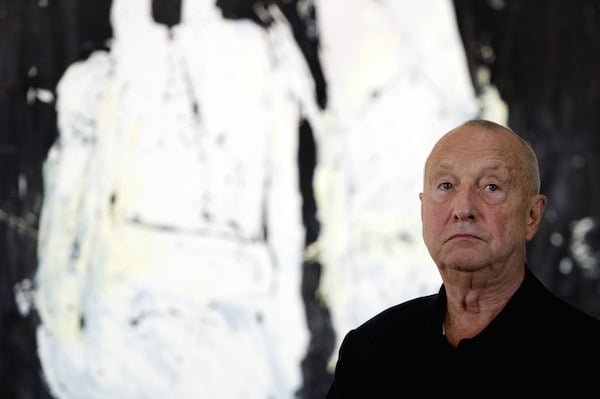
The outspoken German painter Georg Baselitz has taken aim at the increasing politicization of art, describing this recent development in the art world as “fascist” in a remarkable interview about his new exhibition at White Cube, Bermondsey.
Speaking to the Financial Times last week, the artist addressed his monumental Avignon series, shown at the Venice Biennale, while sharply criticizing the biennale show curated by Okwui Enwezor, and not mincing his words about what he believes to be a dangerous tendency to view art through the filter of politics.
“The context in Venice, where everything—a pearl, a sphere—had to be linked to the sociopolitical, is not something I’m interested in,” he said. “Art as a whole has slid down into this fascist corner. This is the prism through which people see art now. I think it’s terrible. An artist shouldn’t involve himself in these experiments,” he insisted.
Georg Baselitz Hotplate fa caldo (Ofenplatte fa caldo) (2015). Courtesy White Cube
Never one to shy away from controversy, Baselitz proceeded to launch an attack on the German media. “I still feel an outsider, completely,” he said. “None of the German media take me seriously, I’m told I’m no longer in the current debate, that I have male chauvinist attitudes.”
The painter has of course, been accused of sexism numerous times. In a 2013 interview with the German magazine Der Spiegel, he claimed “Women don’t paint very well. It’s a fact.”
Two years later, speaking with the Guardian, he stated “Even though the painting classes in art academies are more than 90 percent made up by women, it’s a fact that very few of them succeed.”
Georg Baselitz Oh rosy oh rosy (Ach rosa ach rosa) (2015). Courtesy White Cube
Showing no signs of humility, he said that his new work on show at the London gallery is his best. “Already in the studio I felt they were the best work I’d ever done,” he explained.
Stylistically similar to his signature upside-down paintings, the works deal with the familiar themes of history and politics that shaped Baselitz’s life, having grown up under the totalitarian regimes of Nazi Germany and the GDR. However, the new works feature more honest reflections of his influences and of the realities of aging, mortality, and the passage of time.